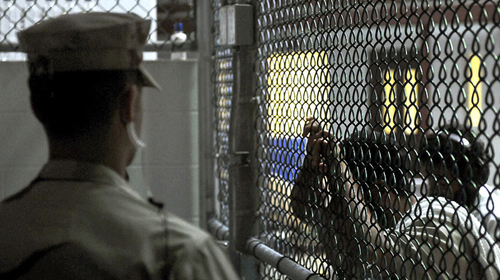
The government is continuing to fight on various fronts to keep its torture program secret. It's not going to win.
Last week I watched the televised feed in the latest round of pre-trial hearings in the death penalty case against Abd al-Rahim Hussayn Muhammed al-Nashiri for his alleged role in the bombing of the U.S.S. Cole.
The hearings focused on the information the government must give to Mr. al-Nashiri's lawyers about his secret detention and torture at the hands of the CIA. Even though the world knows the CIA tortured Mr. al-Nashiri – in part from an internal CIA released to the ACLU in a lawsuit – much concerning the CIA's treatment of him, other military commissions defendants, and potential witnesses remains secret from his lawyers and the public.
Last month, Judge Pohl the government to turn over to Mr. al-Nashiri's lawyers detailed classified records from his "" through the CIA's rendition and torture program. Unfortunately, the government is asking him to roll back the order. In another related request, Mr. al-Nashiri's lawyers are seeking a Senate investigative report that is to date of the CIA's torture program.
Mr. al-Nashiri's lawyers need this information to meaningfully represent their client. They that statements Mr. al-Nashiri made to so-called clean teams at Guantanamo after he spent 4 years in CIA detention must not be used. The defense that the government absolutely cannot execute someone it has tortured. How can the attorneys do their job, if they don't have all of the information?
In addition, as much information as possible about the CIA's torture program must be made public. Basic requirements of transparency, accountability, and human rights demand more openness.
The executive branch could address many of these issues by releasing expeditiously the summary, findings, and conclusions of the Senate's torture report, which it is currently reviewing for declassification. It would do even better to release the full 6,000-page report.
That would have immediate effects on the commissions proceedings, including:
- Clearance of logjams: The prosecution would to provide defense lawyers with summaries and other substitutions for the classified documents covered by Judge Pohl's order. That's unlikely to be adequate in this capital case. With declassification, the relevant information could be shared promptly with defense council and with Mr. Nashiri so that he can participate more fully in his defense.
- More pre-trial proceedings held in the open: During this session alone, the public was shut out of of argument concerning the prosecution's challenge to Judge Pohl's order. Secrecy undermines our tradition of public access to judicial proceedings.
- Fewer oblique witness statements: Last month, Dr. Sondra Crosby, an expert on torture, testified about whether Mr. al-Nashiri is receiving adequate medical care. In her public testimony, she could only say that she saw scars on his body consistent with allegations of torture – but not what those allegations were.
One way or another, transparency will be achieved. The summary of the Senate report will be released, hopefully with few redactions. By June 20, in our lawsuit seeking the release of CIA torture reports, the agency has to provide a specific timeline for declassification. In the meantime, Judge Pohl will soon decide whether to reject the government's request to reconsider his decision. The government won't be able to keep its torture secrets forever.
Learn more about military commissions and other civil liberty issues: Sign up for breaking news alerts, , and .

